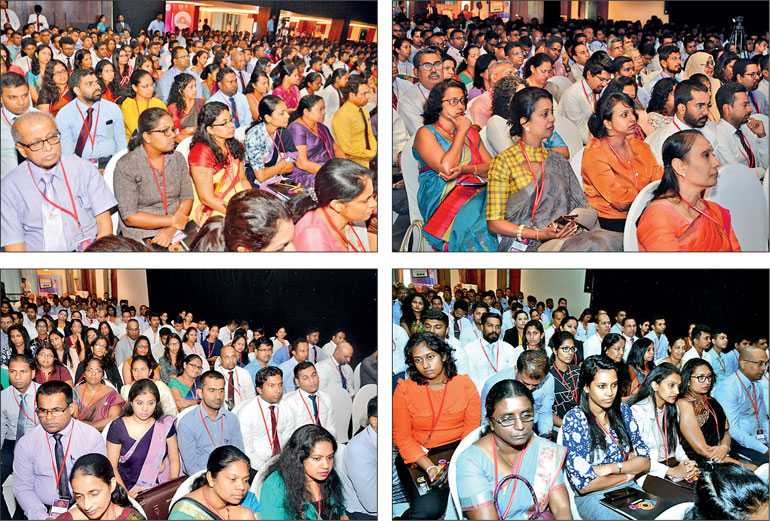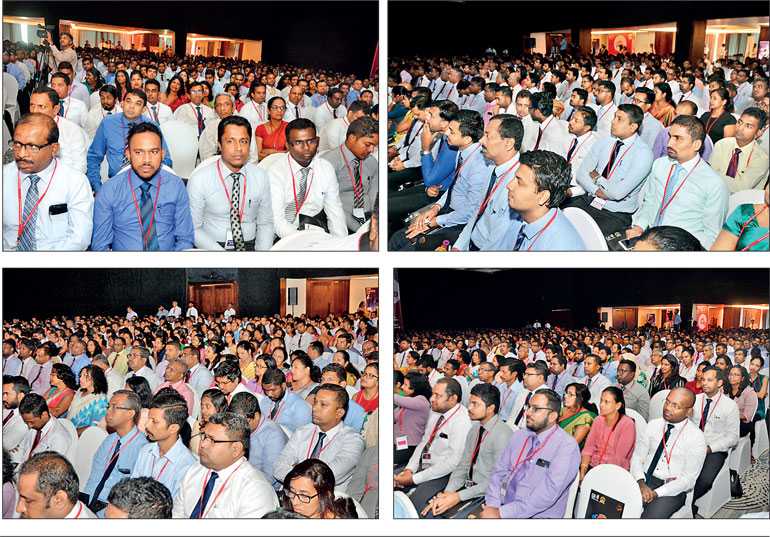Saturday Feb 21, 2026
Saturday Feb 21, 2026
Friday, 25 October 2019 00:00 - - {{hitsCtrl.values.hits}}
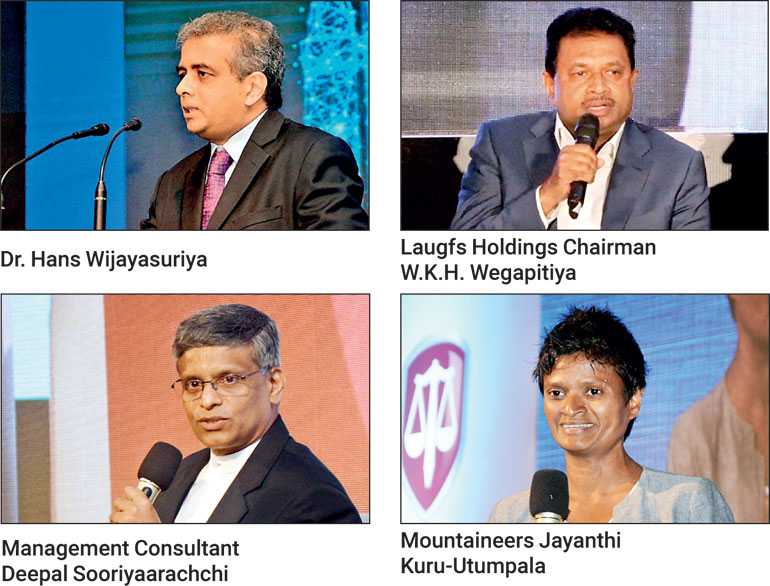
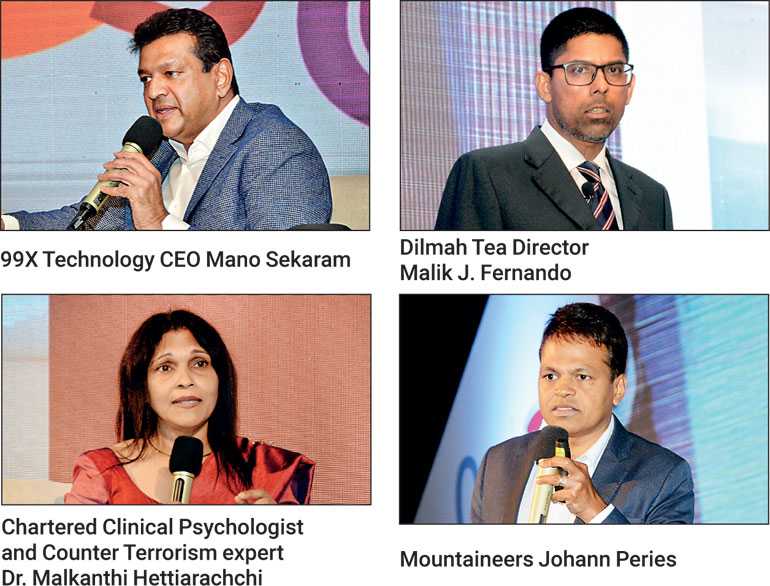
By Darshana Abayasingha
The Institute of Chartered Accountants of Sri Lanka (CA Sri Lanka) hosted its 40th National Conference for Chartered Accountants in Colombo last week. 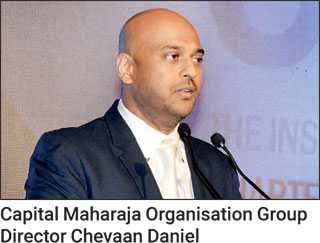
The three-day conference, which attracted over 2,000 participants and is labelled one of the country’s largest forums, was held under the theme ‘Finding Your Mojo: A Journey of Self-Discovery’.
In his keynote address at the opening ceremony, Ceylon Chamber of Commerce Chairman Dr. Hans Wijayasuriya said: “Mojo is about hope, aspiration and seeing the light at the end of the tunnel,” adding that it was up to leaders to ignite the mojo of others and not just their own. He remarked that the private sector had the power to inspire and cultivate the mojo of all people in the country but it was unsustainable to pursue this without being inclusive.
The two-day technical session commenced with Sri Lankan mountaineers Jayanthi Kuru-Utumpala and Johann Peries presenting an engaging session on ‘Self-Mojo’, igniting one’s passion to conquer one’s dreams plus finding the drive to overcome the greatest challenges and achieve a target – which in their case came at over 29,000 feet atop Mount Everest.
During the second session, Dilmah Tea Director Malik J. Fernando presented the Dilmah story under the topic ‘In search of a nation’s magic that has sustained it during most of its history’. During his presentation, Fernando outlined a number of aspects that helped build Dilmah into the globally renowned brand it is today, which was a blend of progressive people, passion and purpose.
He narrated how his father, Merrill J. Fernando, having witnessed multinational brands blending tea, had identified a niche for quality pure Ceylon tea. However, his request for support from the then-Sri Lanka Tea Board in the 1980s to create his own brand and import a tea bag machine had fallen on deaf ears as the Board said Sri Lanka should be exporting tea in bulk.
Fernando paid tribute to the late Victor Santhiapillai, the Export Development Board’s first Chairman, who assisted Dilmah at the time to create this completely Sri Lankan brand.
Malik J. Fernando stressed that Dilmah stood for authenticity, alongside taste, goodness and purpose, adding that this was what the Sri Lankan industry should be doing as opposed to going generic with other exports such as pepper, cinnamon and even its tourism product. Quoting Marco Polo, who described Sri Lanka as the finest island of its size, Fernando averred that the country had fallen victim to a short-sighted and short-term trading mentality, which yielded little long-term value, plus cheapened the quality and value of Sri Lankan products.
Developing national capacity
He pointed out how Sri Lanka being an island imports fish worth over Rs. 40 billion annually, milk powder, pepper and even gemstones from Madagascar which are then branded Ceylon Sapphires. He attributes the trading mentality to a lack of vision and wants to invest his time and effort to develop our own industries. Sri Lanka needs to be adding value to what it produces without saying it is too expensive. This is the sad outcome of a lack of an effective long-term policy and a good bureaucracy, he said.
“Back then, when the business was started, the Government was simple. We had a focused Cabinet and government agents who ran the provinces very well. They knew exactly what was going on. We had a very effective tea research institute, and everything worked where we had very little political interference. What we have now are provincial councils and 94% of the budget of a provincial council goes on wages. Then we have local governments and a massive Central Government. The Government is a collection of individuals with different agendas and that is something we need to fix going forward. We used to have bureaucrats who had five- or 10-year plans. But then permanent secretaries were scrapped as it was considered that they must support the Government’s political agenda, which was not the case before. Nowadays, if you have a problem you go to a Minister not a bureaucrat. A Minister only has a two- or three-year window. The bureaucrats, technocrats and specialists that we had, in my view, are who we need and until they are brought back in, we will not regain the mojo we had back then,” Fernando asserted.
He stressed the need for value addition and to move away from price competition. He highlighted that there was a lack of entrepreneurship in Sri Lanka as the education system was flawed and people must be taught to take risks. Economic development is key to harmony, Fernando said, adding that Sri Lanka lacked a link language and this was why we had issues with communication.
“My answer to people who talk about intolerance is it’s connected to dignity and economic empowerment. If the economy does well, everyone will feel settled. Sri Lanka can turn on a dime but we need vision and we need processes; we need bureaucrats and you know what we need less of,” he said.
He urged other brands and industries to focus on high-end products and add value which brings in higher returns, stating that we did not need cheapness in Sri Lanka. He predicted that tourism in the country would take another two years to turn around.
Chairing the panel discussion on the same topic, Management Consultant Deepal Sooriyaarachchi said that Fernando’s presentation highlighted what this country was capable of, and added that the Sri Lankan public and private sectors, together with entrepreneurs, must take the lead or else even if governments changed, we will be discussing the same things five years from now.
Speaking on the panel, Chartered Clinical Psychologist and Counter Terrorism expert Dr. Malkanthi Hettiarachchi said Sri Lanka was a magical nation, although that may be hard to recognise at the moment in the aftermath of the Easter attacks and the political situation we face. Our diversity was our strength, she said, adding that the country needed a vision, leadership and political guidance to manage this diversity so it could move ahead into the future united, she said.
“These are all difficulties that can be addressed. We overcame the problem of a 30-year conflict which no one thought could be done. It is together as a people that we can come out of this. We have politicians who make the most out of creating divisions. But people should stand together as we are stronger then. We have seen this nation manipulated. We need a very strong and stable security platform. Without that we cannot have a good economic functionality. The Easter Sunday attacks were a direct result of people downgrading the importance of security. If this nation is to find its mojo we don’t need to look far. We need strong leadership,” Hettiarachchi stated.
Entrepreneurial dearth
This panel discussion, which was unceremoniously short, also featured 99X Technology CEO Mano Sekaram, who highlighted that Sri Lanka’s highly coachable talent had made a global impression across diverse sectors. However, he stressed that there was a need for entrepreneurship to boost employment opportunities for a highly-skilled workforce as the growth of job opportunities seemed to have hit a snag.
“The new economy is all about talent, innovation and disruption, and the world is almost one market. There are many Sri Lankan administrators working all over the world and leading team, for our people have the desire and passion to learn. We are in the middle of the next industrial revolution, and the world is going to be based on technology, so Sri Lanka needs to position itself. We need to transform from the old economy to a completely new model. Our old economy is based on cheap labour. If you speak to any unskilled person, they want their children to learn and education receives great importance and that is how you create wealth. But what is sad is that we don’t have enough jobs, because we have not reimagined our economy. People in the North and elsewhere in the country have education but they don’t have jobs. We are heading for a disaster. It’s the lack of economic opportunity that is the problem. It is up to us as leaders to address this. The starting point is Sri Lanka lacks entrepreneurs. Only 1% of our population is entrepreneurial. Entrepreneurs will create new jobs,” he said.
The third session was titled ‘Mojo in one’s career – how do you fall back in love with your job’, with The Capital Maharaja Organisation Group Director Chevaan Daniel delivering the key remarks.
Taking a very people-centric standpoint and drawing from a wealth of personal experience, Daniel noted that he was standing there addressing the audience “because of the mistakes” he made in life, but “not in spite of them”. He said that all world-class performers reached the top of their game by extending themselves beyond what they thought they could actually achieve.
“It takes a lot more than hard work, but relentless focus and commitment to achieve something a little more than you can.”
Daniel pointed out that people often mistook ambition for ego and that ambition did not give anyone the right to have an inflated ego. A healthy ambition, he said, is imagining an achievement in life which is meaningful and that is not restricted to a designation.
“I ask a lot of young people what they want to be in five years. They say a manager, and then I reply, okay I will make you the manager of a restroom, are you happy with that? Some say they want to become a CEO. But what if you don’t become a CEO and does life end there? What is this magic you need to find? It’s not a destination, it’s a journey. No matter how hard you work or how much effort you put in, there is always 10% you can’t control and that in my opinion is your mojo. That is where the magic needs to happen and you need to make it happen,” he said.
Daniel remarked that at times it was necessary to remove oneself from what one was doing to rediscover one’s mojo, and experience was the number of mistakes, decisions and quality of those decisions. The key quality is to continually improve yourself, he noted, narrating a story of a cup of coffee prepared for him by his Chairman. Upon presenting the richly-flavoured cup of coffee, his Chairman had asked Daniel to guess what the coffee was, and the latter had guessed it was something exotic from South America or Indonesia. His Chairman had replied in the negative and said this was regular Nescafe, but with “20 years of trial and error”. Ordinary to extraordinary, Daniel exclaimed, and if you work at something day in and day out, you could turn anything into something extraordinary.
“Widen your horizons and you will be inspired by people and events you never imagined. Part of rediscovering your mojo is to break down the walls around you. Your mojo will discover you if you are relentless in what you do and pursue excellence.”
Harbouring ambition
Joining the panel discussion thereafter and responding to a question on ambition and self-centricity versus humility, MAS Holdings Group Human Resources Director Dinali Peiris said ambition as a word could bring negative connotations, but it could be looked at in a very positive light too.
Firstly, it should be what you want to do and achieve: what is the impact you want to have and does it go beyond a designation. Considering ambition and ego, it is important once on a journey and being recognised, not to let that get to you, where you stop learning and stop investing in yourself, Peiris said. “The moment that happens the journey is going to stop. When you are humble, you allow yourself to have an open mind where you learn with any interaction. I think you can still be positively ambitious, and not let your ego get in the way of that.”
The third panellist speaking on ‘Mojo in one’s career – how do you fall back in love with your job’ was Daraz Sri Lanka Managing Director Rakhil Fernando, who spoke about maturity, adding that he himself used to be “incredibly impatient about career progression and constantly looking for what was out there”. You have a better ability to learn from other people as you mature, he said, though it remains difficult to state when that maturity develops.
He pointed out that he led an organisation of largely young professionals, some of whom had been thrust into senior position at a very young age, and were constantly looking at what was next.
“What I try to show them is to spend the time, help us grow and invest in your role, and the potential of what you do will also evolve with the company. I think it also boils down to the ability to learn and realise that you don’t know.”
This view was echoed by Daniel, who revealed that he received a fantastic opportunity to prove his leadership as a youngster but he knew he was not ready for such a responsibility. He chose to become a management trainee elsewhere and be exposed to leadership and learning before returning to take on his current role.
Peiris added that it was important for youngsters to identify purpose in every little thing they did even if it was something dull and mundane. She narrated how her first job at Slimline was to clean out a record room in preparation for a customer audit. Peiris had just returned to Sri Lanka having graduated and stated that while she could have looked at the task negatively, she had managed to engage with a large section of team members through the process, plus get through the audit with a high degree of learning. “It’s how you look at it. Your mojo doesn’t have to come from the qualifications you bring but certainly from within you.”
“Different spectrums of the organisation would answer differently as to what drives them to come to work. But I am sure a lot of them would say because it gives them the chance to be their best. It gives them a brand new lease of life and provides opportunities that they have not got in life. If you find yourself not wanting to get out of bed and not wanting to come do your job, then you need to reach out for something different,” she added.
Fernando added that one’s specialisation or background had no bearing on what anyone was capable of achieving, and that anyone could switch to a different arena and discover their mojo there at any point in life.
Daniel was asked if he saw a difference between leading the current generation of executives versus those of the past.
“It’s almost night and day. I find that young people in their early 20s expect work to be a bunch of likes and shares, and look for an immediate sense of gratification at the workplace. It just doesn’t work that way. I personally as a leader have changed my style because most new entrants don’t have the understanding that it takes sometimes to go up the ladder, and just because someone shouts at you that’s not a reason to have a Facebook rant. Having someone bad above you is part of life. You could be a day away from an opportunity of your lifetime, and if you start making career decisions based on personal issues you are going to be in the same place always. A bad boss impacts your career progress but can teach you patience and tell you what not to do when you become one,” he said.
Failings of family businesses
Session four focused on ‘The Enterprising Mojo of Family Businesses’, with opening remarks by Laugfs Holdings Chairman and CEO W.K.H. Wegapitiya. In his presentation, Wegapitiya explained that every business was an entrepreneurship at the outset, but lamented that Sri Lanka had failed to create an entrepreneurial spirit, with the country’s citizens tending to be generally myopic.
Pix by Upul Abayasekara
“They don’t see the big picture. For example, these days Artificial Intelligence is the buzzword but we don’t even use our natural intelligence to bring good leaders to the country,” he said.
In Sri Lanka, he explained, family businesses are seen as possessing an inferiority complex and being very old-school and rigid. But he showed that family businesses form the foundation of civilisation and the industrial revolution, and were the predominant form of business in the world.
Echoing the sentiments expressed by Mano Sekaram earlier in the day, Wegapitiya stated that in order to develop Sri Lanka, the 217,321 registered companies in the country should be doubled. Almost 90% of businesses in the country are founder firms or family businesses, he stated.
However, they had a reputation for not being able to survive long. They’re long-term survivability was poor, as statistics showed that 70% of founder firms disappeared within the lifespan of the founder. Only 13% survive to the third generation and only 3% survive beyond that, Wegapitiya revealed, citing global studies.
“In finding mojo for family businesses, we need to see why this is happening. There are many theories: they say father entrepreneur, son playboy, grandson beggar. Whatever ideas the entrepreneur has, when it is transferred to the family it can become difficult. They say 82% of all founder firms fail within the first five years. According to the business lifecycle theory, businesses boom and bust in a predictable wave period of standard length. In the Asian context, the lifespan of a founder firm is 25 years. In certain matured economies, it has come down to 10 years. So there are things every founder should proactively do after reaching about 20 years or else the curve starts coming down and world-class companies can suddenly disappear.”
Adding to the panel discussion was Hemas Holdings Plc Executive Director Murtaza Esufally and CBL Group Managing Director Sheamalee Wickramasingha, leaders of reputed family diversified businesses in the country. Esufally provided insights into how his family groomed and managed different dynamics and personalities for the business.
“Our mojo was kindled in our dining rooms and our living rooms when we were children. The family heroes are businesspeople and entrepreneurs. Lots of stories on risk, success, highs and lows which were repeated when we were children, those stay with you. Then there is healthy rivalry between your brothers and cousins and that’s a tremendous source of motivation, when you try to earn the respect of your father or grandfather.
“I also feel that what was inculcated in us at an early age was a culture of discipline. It was ground into us that a culture of hard work was critical. So, you worked hard to impress them. You have to set the tone at the top and that rubs off on the professional managers we take on. Very early on in the family we decided that the family is there for the business, the business is not there for the family. It’s a subtle but fundamental approach that we will sacrifice for the business. We discussed this amongst the family and our shareholders.
“Of course, we have more professional managers now, which can occasionally lead to tensions. But we also learnt that we must make the rules when the going is good, for naturally there are disagreements. So we invested many hours in managing the family through a family constitution, we have a family council and each of us is governed by a constitution and a set of rules. This includes how I may get my children into the business, what is the route and criteria, how they are promoted. We remind them you can be a shareholder whereby you can get a dividend, or you can be a manager here in which case you need to be qualified, etc. Or you could even be a Non-Executive Director after accumulating a certain amount of experience. I think in our family the emphasis on education is very strong. With education also that culture of discipline comes in,” Esufally explained.
He alluded to the presentation by Wegapitiya and said that after 70 years, Hemas too was reaching the stage of the 3% of family businesses that survive beyond the third generation, and added that the passion, energy and enthusiasm of his grandfather, father, uncles and cousins still drove enterprising discussions in the boardroom.
Esufally highlighted the support and direction provided by good professionals and independent directors to steer the business. He also pointed out, quoting studies, that family businesses were very good at managing downturns. During tough times, family businesses globally had fared far better than professionally-managed enterprises, while the latter had done better during good times.
Wickramasingha opined that family businesses were much faster at making decisions than professionally-run organisations, whereby the former were able to come together and arrive at a decision in a far more effective manner. Reflecting on the transition of management from her founding father to the next generation, where she took over as Group Managing Director, Wickramasingha said that they were fortunate to receive support and input from some great independent directors who paved the way for the transition.
There comes a time when every entrepreneur has to realise that they must prepare for the time when they no longer have that kind of energy and then you bring in professional managers, she said. Long before the next generation got started in the business, CBL started getting professional support with its business so the company achieved a balance. No one can really replace the entrepreneur, everyone else plays a very different role, but the question remains how do you keep this passion and energy, Wickramasinghe asked.
“We did our studies not always with the intention of coming back, although that obligation was always made, and some of us worked outside before we did. But we always felt that obligation that we need to come and at least give it a try. We grew up in the business hands on, with no fancy positions. Being a family member, we still needed to earn our stripes. Nothing was given. Everyone treats us differently and that is difficult to avoid, but having managed divisions and worked with teams, whether you are family or not, you have to deliver results at the end of the day. You still have to learn to lead and deliver,” she asserted.
